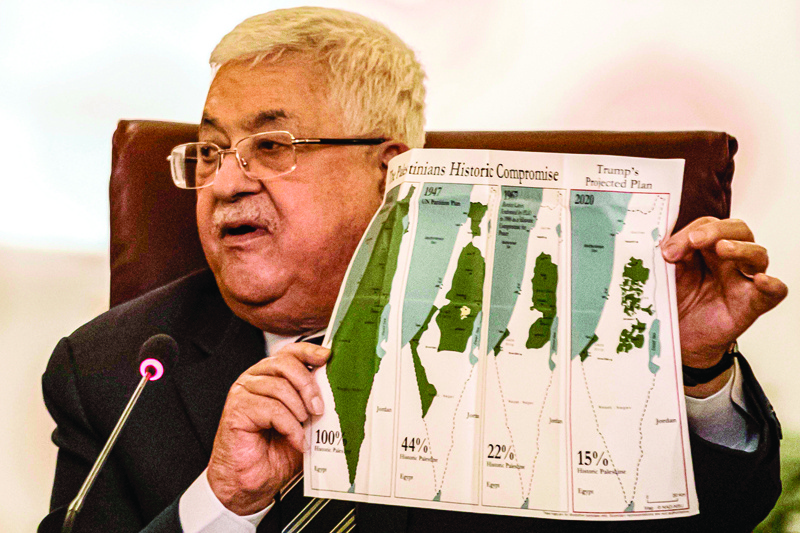
CAIRO: Palestinian leader Mahmoud Abbas announced yesterday a cut of all ties with Israel and the United States, including security cooperation, after Washington unveiled a controversial Middle East plan seen as favoring Israel. His comments came as the Arab League rejected US President Donald Trump's plan, which infuriated the Palestinians.
"We are informing you that there will be no relations with you (Israel) and the United States, including on security cooperation," Abbas said at an extraordinary meeting of the pan-Arab bloc in Cairo. The Palestinian leader said the move followed the "disavowal of signed agreements and international legitimacy" by the US and Israel. Israel will have to "bear responsibility as an occupying power" for the Palestinian territories and Palestinians will press ahead with resistance using peaceful means, he said.
Abbas also said yesterday he had refused to discuss the plan by with Trump by phone, or to receive even a copy of it to study it. "Trump asked that I speak to him by phone but I said 'no', and that he wants to send me a letter … but I refused it." Abbas said he did not want Trump to be able to say that he, Abbas, had been consulted. He reiterated his "complete" rejection of the Trump plan.
In July 2017, Abbas announced the suspension of security coordination with Israel during a major dispute over the flashpoint Al-Aqsa mosque compound in Jerusalem. It was resumed later that year though the chief of the Palestinian police said that even during the suspension they had maintained regular contact, with 95 percent of the activities continuing. "The only thing we stopped is we didn't meet them in the field," Hazem Atallah said at the time.
The Cairo meeting brought together Arab senior officials including Saudi Arabia's foreign minister and the United Arab Emirates' minister of state for foreign affairs. In statement released afterwards, the Arab League said it rejected Trump's plan as it failed to meet "the minimum rights and aspirations of Palestinian people". Arab leaders also vowed "not to … cooperate with the US administration to implement this plan". They insisted on a two-state solution that includes a Palestinian state based on borders before the 1967 Six-Day War - when Israel occupied the West Bank and Gaza - and with east Jerusalem as its capital.
Kuwait's Foreign Minister Sheikh Ahmad Nasser Al-Sabah said on Saturday that the "Palestinian cause" remains the Arab world's perennial concern. Leading Kuwait's delegation to the meeting of foreign ministers from Arab League member states in Cairo, he said Kuwait studied the US vision of Middle East peace and appreciates its efforts to solve one of the world's most lingering conflicts, but any solution needs to protect the rights of Palestinians and adhere to international laws.
Citing the two-state solution based on the borders in place before the 1967 war as the only feasible way out of the conflict, the Kuwaiti foreign minister said any solution should not allow Israel the right to "threaten" Arab and Islamic presence in the holy city of Jerusalem. He emphasized that Kuwait will always stand by the Palestinian people, urging the international community to ultimately recognize an independent state of Palestine with East Jerusalem as its capital.
The US plan suggests that Israel would retain control of the contested city of Jerusalem as its "undivided capital" and annex settlements on Palestinian lands. Trump said the Palestinians would be allowed to declare a capital adjacent to Israeli-annexed east Jerusalem.
He announced the plan on Tuesday flanked by Israeli Prime Minister Benjamin Netanyahu and in the presence of Arab ambassadors from Bahrain, Oman and the United Arab Emirates. Other Arab states gave carefully worded initial responses to the plan, which was strongly rejected by Palestinian leaders. Abbas said the US plan was in "violation of the (autonomy) accords" launched in Oslo in 1993 by Israel and the Palestinians.
The Trump plan gives Israel the green light to annex the strategic Jordan Valley - constituting some 30 percent of the West Bank - and all Israeli settlements, which number more than 200, including those in annexed east Jerusalem. The settlements are home to some 600,000 Israelis, but are considered illegal under international law. Abbas said that while Israel would immediately start annexation, under the plan the Palestinians would have to wait four years, until they show "good will", to get a limited state.
The Palestinian leader said he would go to the United Nations Security Council soon to call for an international conference to re-launch negotiations with Israel. This would be under the auspices of the diplomatic Quartet comprised of the United States, the European Union, the United Nations and Russia, Abbas said. "But we will not accept the US alone. We have tried it already," he added. - Agencies










